
Dentures and Partials - Garland, TX
Replace Your Missing Teeth and Improve Your Appearance
If you’re tired of looking at an incomplete smile, you’ll be happy to know there is a solution that will replace your missing teeth and improve your appearance. Whether you’re missing several teeth or all your teeth, dentures in Garland and partial dentures can give you a functional, affordable, and complete smile. At La Prada Family Dentistry of Garland, we will work with you to create a beautiful restoration that is custom-made to your individual needs. Not only will it look natural, but you’ll be surprised how quickly you’ll adjust to your new prosthetic. Our dental professionals want to help you take back your smile, so call us today to schedule a consultation to discuss options to replace missing teeth with dentures and partials in Garland, TX.

Why Choose La Prada Family Dentistry of Garland for Dentures and Partials?
- Customized restorations to meet your individual needs
- Evening and Saturday appointments available
- Knowledgeable and highly skilled dental professionals
Who’s a Good Candidate for Dentures?

Visiting your dentist for an initial consultation will be your first step towards renewing your smile with dentures. Our team will examine your mouth and determine if you’re eligible for the treatment. We’ll need to see if you have any underlying issues like decay and gum disease, and provide preliminary treatments if necessary to ensure your gums and jawbone are healthy enough for the custom prosthetics. Here are several key things you should consider when determining if you’re a good candidate for dentures in Garland.
Effects of Missing Teeth

Replacing missing teeth is incredibly important, as you’ll want to avoid any further complications from tooth loss. Firstly, some of the most common reasons for losing pearly whites include decay, accidental injury, gum disease, and poor oral hygiene. There are also certain medical conditions that can raise your risk of tooth loss, such as diabetes.
Several issues that come from not replacing missing teeth involve further potential tooth loss, as any of your remaining ones can start to move out of place to fill the gaps. Your jawbone can also begin to deteriorate due to a lack of stimulation, causing the bone to shrink and change your facial structure. Other troubles include gum recession, difficulty eating, trouble speaking, facial sagging, and significantly reduced self-esteem.
Of course, the cheapest dentures aren’t ideal. Those sorts use inferior acrylic for their bases and teeth. Therefore, remember to choose high-quality sorts!
What Qualifies You for Dentures?

If you’re missing teeth, then you’re likely qualified for dentures in Garland. Our team will first need to confirm that your gums and jawbone are strong and healthy enough to support your prosthetics. Any underlying problems like decay, cavities, gum disease, or infection will need to be addressed before moving forward.
The kind of dentures you’ll receive will also depend on the number of teeth that you’re missing. For instance, you might choose between partial dentures, full dentures, and implant dentures based on your situation and what your dentist deems is viable for you. This treatment is also beneficial for those who are working with a budget, as your prosthetics will be more cost-effective compared to more costly procedures.
Alternative Tooth-Replacement Options

If dentures aren’t a good fit for you, you can still consult our team to figure out an alternative method for replacing your missing teeth. We offer other services like:
- Dental bridges : This restoration is usually reserved for patients missing one or several teeth in a row. It simply requires healthy adjacent teeth to support the two dental crowns and pontics that create the bridge.
- Dental implants : Instead of resting on the gums or using healthy teeth, our team can embed dental implants into your jawbone to directly anchor your restorations. This will provide optimal stability for your new teeth while promoting strong bone tissue to preserve a more youthful facial shape. You can also expect the results to last several decades to a lifetime with proper care.
Types of Dentures
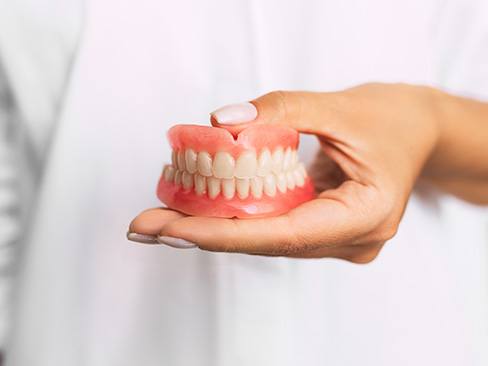
Modern dentures are comprised of materials that make them more lifelike, while their design is less bulky and prioritizes personal comfort and stability. Additionally, you can choose from several types of dentures based on your specific needs. During your initial consultation, we will recommend one of the three types of dentures listed below.
Partial Dentures
Partial dentures are ideal for minor cases with just a few missing teeth as well as more extensive cases with multiple gaps throughout the mouth. They are secured in place using a metal clasp attached to the natural teeth.
Full Dentures
A full denture replaces an entire row of teeth. If most of your teeth are lost and the remaining ones aren't worth saving, they can be extracted to accommodate the prosthetic. Full dentures are typically held in place by natural suction, but adhesives are available for added security if needed.
Implant Dentures
We can secure your dentures to dental implants inserted directly into your jawbone, eliminating the need for natural suction or metal clasps. Implant dentures are designed to be permanently anchored, but they can be made removable if you prefer.
How Does a Dental Implant-Retained Denture Work?
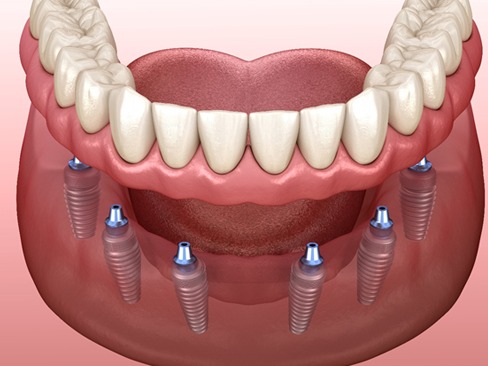
As we mentioned earlier, dentures and partials have been a go-to solution for patients with missing teeth for many years. Over time, new and improved methods of treatment have come along to offer patients a more stable and permanent solution. Implant-retained dentures not only offer an aesthetically pleasing appearance, but they can restore your smile from the root up!
Once the implants are placed and stitched up, you’ll spend the next several months healing at home and allowing the implants to properly fuse to the bone. Once you’re healed, you’ll return to our dental office and have your custom-made denture affixed to the top of your implants.
How Dentures are Made
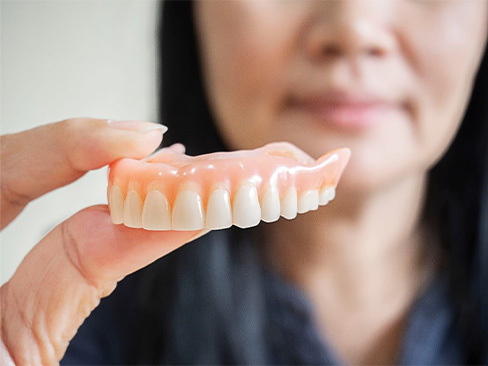
Before you actually get dentures, you may want to know how they’re made. After all, you’ll be putting these restorations in your mouth daily. It’s only fair that you grasp what holds them together. However, perhaps you aren’t sure where to learn the facts. Fortunately enough, La Prada Family Dentistry is here to help: below is a summary of denture parts and how labs make them. So, keep reading to understand what went into your prosthetic teeth.
What are Dentures Made Of?
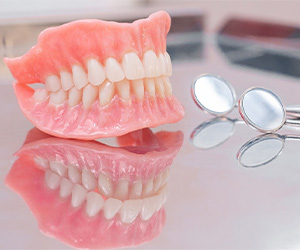
Whether partial or full, all dentures have two core parts: the base and the artificial teeth. Each of these components is crucial for the treatment to work correctly. To find out why, just look at the following details:
- The Denture Base – Put simply, a denture’s base supports its artificial teeth. It thus sits on a patient’s gums and uses pink coloring to blend with its surroundings. Generally, a dental lab can make one from acrylic, nylon, porcelain, resin, or metal.
- The Artificial Teeth – Artificial teeth (per their name) are a denture’s tooth-replacing portions. Most dental labs make them from resin or porcelain, ensuring lifelike results. Still, most patients prefer porcelain models – they look and feel more like natural tooth enamel.
The Denture Creation Process

Since a denture is custom-made for a particular patient, making one involves a multi-step process. That being the case, here’s a look at how this appliance is made:
- Step 1: Your dentist takes a dental impression of your gums. Afterward, the resulting model is sent to a lab that makes the final dentures.
- Step 2: Once crafted, the lab sends wax dentures to the dentist/prosthodontist for a fitting. Assuming patient and dentist approval, the restorations are returned to the lab for completion.
- Step 4: A technician boils the dentures to remove their wax portions. This individual then places the prosthetics in a flask to pour plaster. Subsequently, the flask is placed in hot water to melt the dentures.
- Step 5: The lab worker makes holes in the artificial teeth so new material can attach. A liquid separator is also added to the plaster layer to prevent the acrylic from sticking. The same acrylic is then injected into the flask to replace the wax.
- Step 6: The worker removes the plaster to reveal the prosthetics. Later, they place the dentures in an ultrasonic bath to remove leftover plaster.
- Step 7: After cutting away excess acrylic, the technical polishes the restorations
- Step 8: The patient returns to the office for fitting and final adjustments.
Adjusting to Your New Dentures
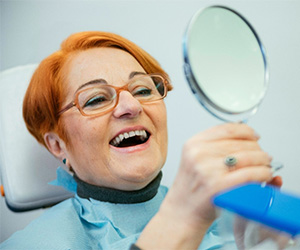
As you start wearing new dentures, you may feel some discomfort. That’s normal – adjusting to the restorations can cause soreness and even trouble eating or speaking. Luckily, these symptoms are temporary and fade quickly. The dentures will start to feel like natural teeth in no time.
Even so, it’s possible to speed up adjustment if you’d like. You simply need to adopt and practice the right oral habits. For example, eat softer foods for a while to reduce chewing-related aches. Other ideas include strengthening your facial muscles or using dental adhesives.
However you manage with adjusting, try to be careful. You may need to see your dentist if denture aches persist. In that scenario, your restoration may need to be further tuned.
The Benefits of Dentures

Full and partial dentures have been around for many years, making them one of the most effective methods of tooth replacement. It is also a popular option for individuals dealing with missing teeth. The reason so many people choose dentures and partials is because of their many benefits. Here are some of the most prominent ones.
Psychological Benefits

If you don’t have any healthy teeth, this can be difficult to accept. A lot of people who have lost most of or all of their teeth encounter negative effects on their self-confidence, resulting in higher levels of sadness and depression. When you restore your smile with dentures, you can feel better about your image, reducing anxieties regarding your appearance, speech articulation, chewing ability, and more.
Clearer Enunciation

Making certain sounds and saying different words is challenging when you have gaps in your smile. To enunciate your words properly, your lips and tongue must be positioned properly. When you are missing teeth, your tongue isn’t able to be positioned properly, making some words very challenging to say. Since dentures act as your missing teeth, they give you the ability to speak more clearly.
Improves Nutrition

Many nutrient-dense foods are tough in texture. This includes healthy proteins, fruits, and vegetables. If you aren’t able to chew these foods, your eating habits will be negatively affected, resulting in poor dietary choices and indigestion. When you have dentures, you can chew more easily, giving you the freedom to enjoy an expansive diet.
Preserves Oral Health

If you have healthy natural teeth, dentures can help to keep them in excellent shape. By filling in the gaps with a partial denture, you can keep the surrounding teeth from shifting around. Dentures also help to bear some of the weight of regular biting and chewing, limiting the wear and tear of the natural teeth.
Expands Opportunities

When you are attending interviews, negotiating sales, and attending social events, making an excellent first impression is key. Since your smile is one of the first things people notice about you, having one that appears healthy will do nothing but aid you in your endeavors. Studies have shown that the probability of being employed is negatively associated with having poor oral health.
Denture FAQs

Will It Hurt to Get Dentures?
Getting dentures may involve some discomfort, especially if teeth need to be extracted beforehand. You may experience soreness after oral surgery, which usually improves within 3 to 5 days with prescribed pain medication. New dentures may initially cause minor irritation as your mouth adjusts, which can last for weeks or even months. Switching to a new set of dentures might extend the adjustment period. If pain persists, contact your dentist to ensure proper fit and rule out any underlying issues.
Can Dentures Reduce Life Expectancy?
Dentures can actually increase life expectancy and improve healthspan by allowing people to eat a wider variety of nutritious foods and engage more socially. This social engagement and better nutrition contribute positively to overall health. However, not caring for dentures (such as improper cleaning) can increase the risk of infections, including pneumonia if bacteria from an unclean prosthetic are inhaled during sleep. Proper maintenance of dentures is essential to avoid these risks.
Can I Use Regular Toothpaste to Clean My Dentures?
You should not use regular toothpaste to clean your dentures, as it is abrasive and can cause microscopic scratches, leading to serious damage over time. Instead, clean your dentures daily with hand soap, mild dishwashing liquid, or specialized denture cleaners. Use a soft-bristled toothbrush to avoid scratches. Clean your dentures after every meal to maintain proper hygiene and ensure their longevity.
I Need a Checkup & Cleaning I am Looking for a Dentist for My Child I am Concerned About Bleeding Gums I Have a Cavity or Broken Tooth I am Unhappy with My Smile I Want
a Straighter Smile I am Afraid/Anxious of the Dentist
I am in Pain & Need Help I Need My Wisdom Teeth Removed View
Our Services



